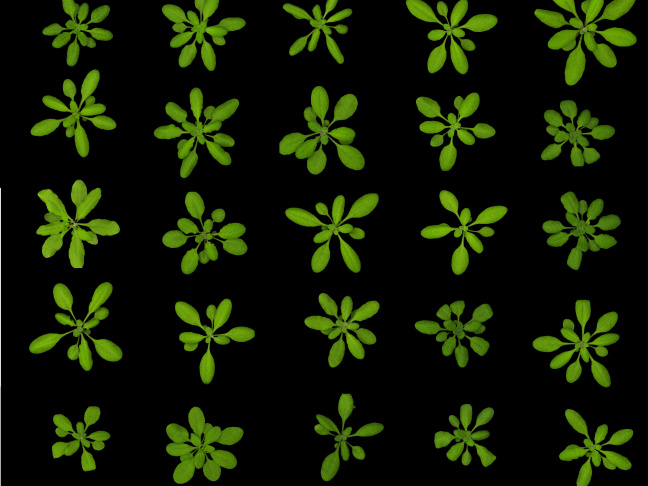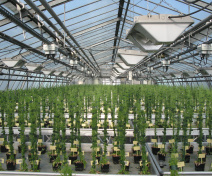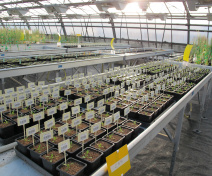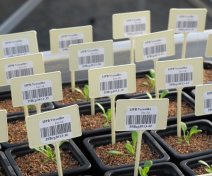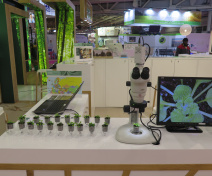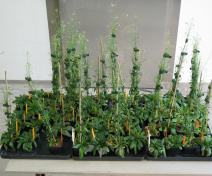The PO-Versailles Arabidopsis Stock Center (VASC) collects, produces and characterizes Arabidopsis thaliana plants with different genetic characteristics, for example natural variants or mutants. These resources are both distributed to the scientific community and used in PO-VASC research projects.
Available Resources
The PO-VASC has created large collections of mutants, which are used to investigate the functions of the genes. It also offers numerous worldwide natural variants, as well as plants resulting from crosses between these variants, which allow the analysis of the impact of natural diversity, particularly on complex traits of plant life such as growth, development, reproduction, stress tolerance, etc.
When publishing your results that use these resources, please cite: Ricou et al. (2025) Genetic Resources, (S2), 70–77, DOI.
The PO-VASC was certified by IBISA in 2023 and is part of the National Research Infrastructure RARe (Agronomic Resources for Research). Its commitment to quality is demonstrated by the ISO 9001 certification obtained in October 2024.
Biological Questions
An essential question in biology is to understand the origin of speciation. We are interested in hybrid incompatibilities observed in the PO-VASC collections, a phenomenon in which the fitness of hybrids is much lower than that of the parents. These hybrid incompatibilities create reproductive barriers and can therefore lead to the formation of different species. Given the amount of genetic resources available, Arabidopsis thaliana provides an excellent model to explore the genetic and molecular mechanisms behind such incompatibilities.
In addition, our resources are essential to many other IJPB teams. For examples:
> By screening the collection of HEM mutant lines, The FTA team has identified plants affected in the formation of hydathodes, small organs located at the leaf edge through which guttation occurs, which are an entry site for certain pathogens. This team is also looking for the genetic determinants of an original mechanism of direct regeneration of buds from roots, related to suckering. Numerous natural accessions have been studied to explore the variability of the phenomenon, and several QTL responsible for regeneration have been identified in RIL populations.
> A project of the SAS team aims at identifying the factors involved in allelopathic processes by an association genetics approach (GWAS) using populations of natural accessions, but also resources useful for the validation of the identified candidate regions (F2 populations, HIF, mutants).
The PO-VASC has created large collections of mutants, which are used to investigate the functions of the genes. It also offers numerous worldwide natural variants, as well as plants resulting from crosses between these variants, which allow the analysis of the impact of natural diversity, particularly on complex traits of plant life such as growth, development, reproduction, stress tolerance, etc.
When publishing your results that use these resources, please cite: Ricou et al. (2025) Genetic Resources, (S2), 70–77, DOI.
The PO-VASC was certified by IBISA in 2023 and is part of the National Research Infrastructure RARe (Agronomic Resources for Research). Its commitment to quality is demonstrated by the ISO 9001 certification obtained in October 2024.
Biological Questions
An essential question in biology is to understand the origin of speciation. We are interested in hybrid incompatibilities observed in the PO-VASC collections, a phenomenon in which the fitness of hybrids is much lower than that of the parents. These hybrid incompatibilities create reproductive barriers and can therefore lead to the formation of different species. Given the amount of genetic resources available, Arabidopsis thaliana provides an excellent model to explore the genetic and molecular mechanisms behind such incompatibilities.
In addition, our resources are essential to many other IJPB teams. For examples:
> By screening the collection of HEM mutant lines, The FTA team has identified plants affected in the formation of hydathodes, small organs located at the leaf edge through which guttation occurs, which are an entry site for certain pathogens. This team is also looking for the genetic determinants of an original mechanism of direct regeneration of buds from roots, related to suckering. Numerous natural accessions have been studied to explore the variability of the phenomenon, and several QTL responsible for regeneration have been identified in RIL populations.
> A project of the SAS team aims at identifying the factors involved in allelopathic processes by an association genetics approach (GWAS) using populations of natural accessions, but also resources useful for the validation of the identified candidate regions (F2 populations, HIF, mutants).
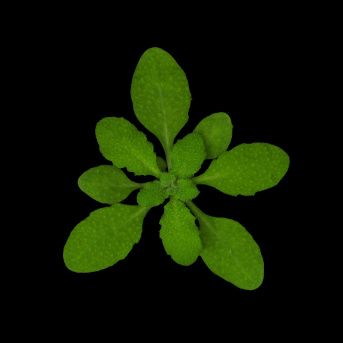

Platform head:
Carine Géry
